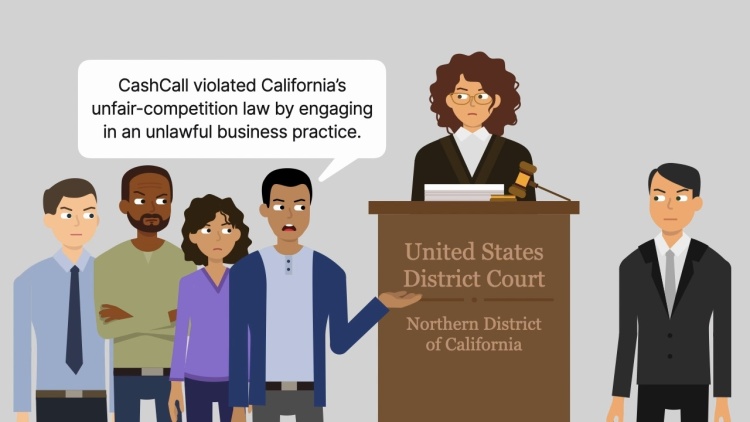De La Torre v. CashCall, Inc.
California Supreme Court
5 Cal. 5th 966, 236 Cal. Rtpr. 3d 353, 422 P.3d 1004 (2018)
- Written by Liz Nakamura, JD
Facts
CashCall, Inc. (defendant) issued low-value, unsecured consumer loans to high-risk borrowers at astronomical annual interest rates. The type of loans CashCall specialized in were typically referred to as payday loans. CashCall advertised its products to desperate borrowers who needed quick cash, and its most popular product was an unsecured $2,600 loan with an annual interest rate between 96 and 135 percent. A group of borrowers, led by Eduardo De La Torre (plaintiff), brought a class action against CashCall under California’s unfair-competition law (UCL), arguing that CashCall’s business practices were unlawful because CashCall charged unconscionably high interest rates. All class members had taken out loans of at least $2,500 that were subject to annual interest rates of over 90 percent. The California Finance Code (CFC) imposed an interest-rate cap on loans under $2,500; however, the interest rates on loans over $2,500 were not capped. The CFC also stated that the unconscionability doctrine could be applied to all consumer loans. CashCall moved to dismiss the class action, arguing that CashCall’s interest rates could not be held unconscionable as a matter of law because there was no interest-rate cap on loans over $2,500. The district court agreed and dismissed the class action. De La Torre appealed. On appeal, before issuing a decision, the Ninth Circuit certified a question to the California Supreme Court regarding whether the unconscionability doctrine could be applied to invalidate the interest-rate provision on a loan that was not subject to the CFC’s interest-rate cap.
Rule of Law
Issue
Holding and Reasoning (Cuéllar, J.)
What to do next…
Here's why 907,000 law students have relied on our case briefs:
- Written by law professors and practitioners, not other law students. 47,100 briefs, keyed to 996 casebooks. Top-notch customer support.
- The right amount of information, includes the facts, issues, rule of law, holding and reasoning, and any concurrences and dissents.
- Access in your classes, works on your mobile and tablet. Massive library of related video lessons and high quality multiple-choice questions.
- Easy to use, uniform format for every case brief. Written in plain English, not in legalese. Our briefs summarize and simplify; they don’t just repeat the court’s language.





